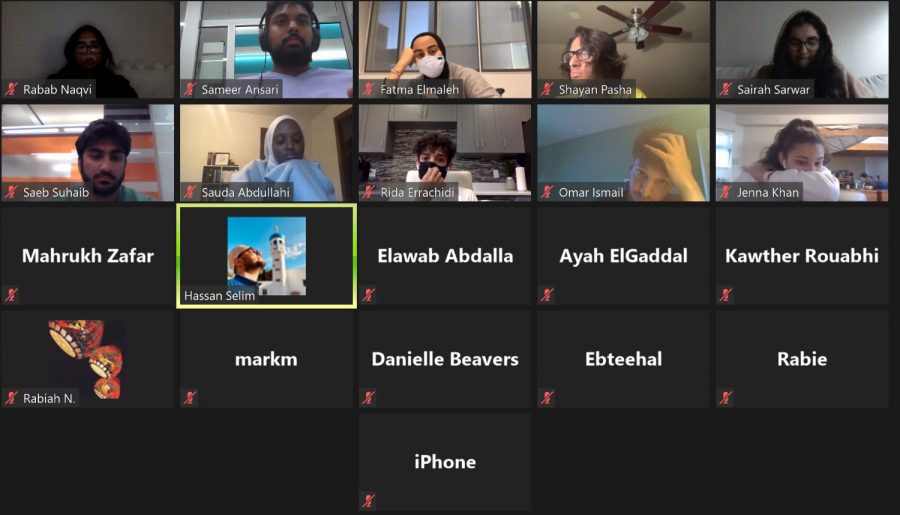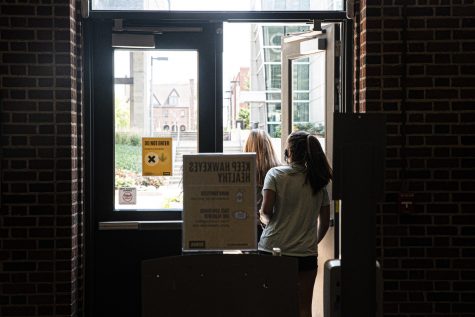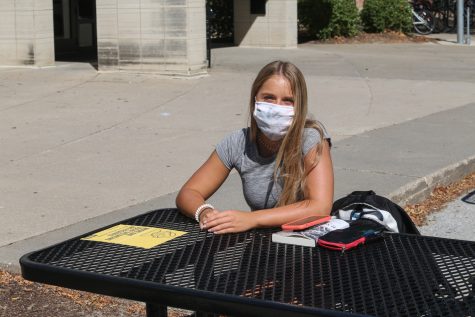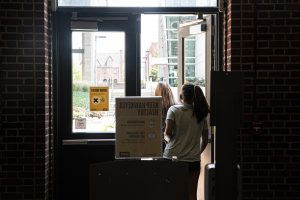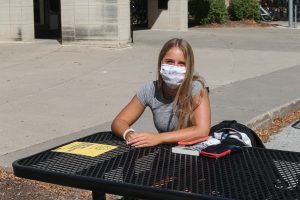University of Iowa student organizations find different ways to practice their faith, build community
With COVID-19 cases continuing to rise on campus, University of Iowa faith-based student groups are making different adjustments to practice their faith and build community during the Fall semester, including The SALT Company, Muslim Student Association, and the Chabad Jewish Student Association.
Fatma Elmaleh
University of Iowa Muslim Student Association meet on Zoom for a Halaqa about racism and Islam on Sept. 3. Contributed sceenshot.
September 7, 2020
With COVID-19 cases continuing to rise across campus, faith-based student groups and organizations at the University of Iowa are adapting to new university guidelines for the fall semester.
As a first-year student entering the UI, Kennedy Albertson said she was looking to get involved with a community to practice her faith with.
Growing up, Albertson said she attended church regularly and was always involved with youth groups such as the Fellowship of Christian Athletes.
Albertson said she wanted to continue practicing her faith with a community at the college level.
Despite COVID-19 mitigation measures impeding the ordinary freshman experience, she said the pandemic didn’t inhibit her from finding that community with the SALT Company.
Albertson said she joined a group chat for the organization from the freshman Facebook page, where events, meetings and locations were posted.
“They also told us that they’re not actually an official student organization this year so that way they’re able to still meet and do different things together and have events,” Albertson said. “So that’s really nice to be able to actually meet with people and get to know people that way, and just feel like I’m surrounded by a lot of good people.”
This semester, all in-person events held by UI student organizations must follow public health and UI guidelines, and gatherings of more than 10 people are being directed online by the UI.
RELATED: Faculty say University of Iowa unprepared in COVID-19 response
Albertson said since SALT has disaffiliated from the UI, there’s no limit to the number of people at the SALT Co. events, the first of which were held at Hubbard Park and Veritas Church.
“Social distancing isn’t too much of a concern just because everyone is wearing their masks and I think people are more concerned about just what’s going on and focusing on growing in their relationship with God and being surrounded by so many great people,” Albertson said. “At this point it’s like, ‘it’s OK, we’re in his hands,’ so it doesn’t matter if we get sick, everything’s going to be okay as long as we’re doing what we’re supposed to be doing.”
Social media chair for the UI Muslim Student Association Fatma Elmaleh said the organization will be operating entirely online this semester.
The organization had to cancel their biggest event of the year, the Eid Dinner, which normally takes place at Hancher Auditorium or the IMU ballroom during the first week of the semester, Elmaleh said.
She said the association had their first virtual event, a Halaqua discussion about racism and Islam last week. The organization is planning on doing more online socials and games, and that they are still adapting to the virtual format.
“To me honestly, I feel as a Muslim in America, having the atmosphere and actually getting to connect with everyone in person, it gives you kind of a sense of belonging,” Elmaleh said. “You have people that you can relate to, and just not seeing them as often in real life is kind of sad.”
Although it’s difficult to maintain a sense of community virtually, Elmaleh said the association never considered disaffiliation from the university.
“One of the things that our prophet said [is], ‘if there’s a plague in your city, don’t travel somewhere else because you might transfer it,’” Elmaleh said. “So, even though we want to see each other, we were taught not to do that.”
Secretary for the Muslim Student Association Sauda Abdullahi said the organization will continue recruiting throughout the semester.
RELATED: Deaf, hard of hearing students with new communication challenges due to COVID-19
“The first thing I did when I came to the university was try and find other Muslims,” Abdullahi said. “Just because we have [similar] practices and values and things like that, and so every time we got together it was like a nice sense of community. So not having that face-to-face time kind of sucks.” Abdullahi said.
Rabbi for the Chabad Jewish Student Association at the University of Iowa and Lubavitch of Iowa City Avremel Blesofsky said recruiting new members has been a challenge for the recognized Jewish student group.
Blesofsky said that ordinarily, the group holds social activities, educational classes, and one-on-one conversation, but since the pandemic, that has come to a halt.
Now most events are held electronically via Zoom, Blesofsky said. The student branch has not considered disaffiliation from the university, but students do have the option to join the community branch, Lubavitch of Iowa City, which offers additional services, he said.
“Maybe two months ago we had a social distance service…we had a small crowd that came,” Blesofsky said. “I think even within the community people are…playing it really cautious.”
With Jewish new year Rosh Hashanah coming up, Blesofsky said the organization will be scaling back the larger event they normally have, but will be offering a socially distanced Shofar at the River service on Sept. 20 behind the IMU.
“People thrive on social interaction,” he said. “As humans I think we all want it, we need it, I think people are really missing that. I’ve been contacting members and students one-on-one, and there’s a more personal connection that is developing through the pandemic. They’re looking for that guidance or even just that connection. So I want to say that a bit of a silver lining — is that people are looking to connect.”



